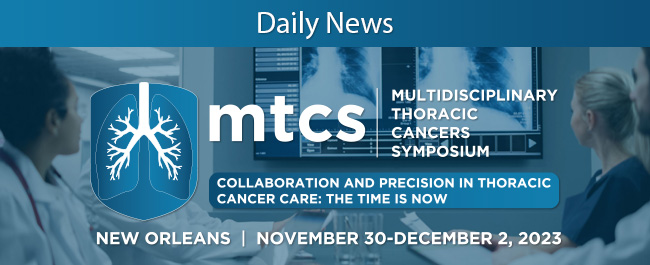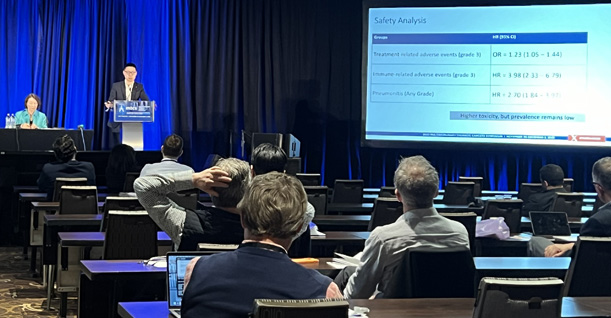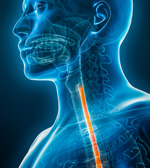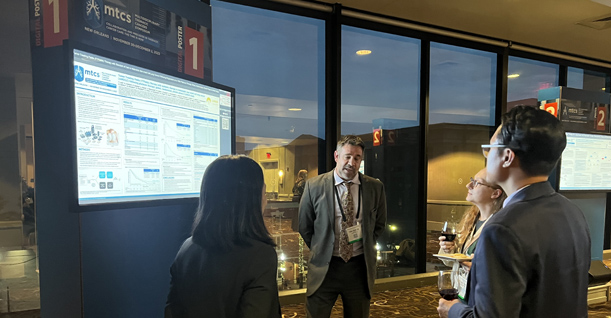| December 2, 2023 |

|
| |

|
|
Abstracts | Social Q&A | Exhibits | Daily News
|
| |
|
Today's Highlights
Day 3 Welcome | 7:55 a.m. - 8:00 a.m., Linda Martin, MD, MPH, University of Virginia Health Systems
Stage III: Innovation on the “Big Stage” | 8:00 a.m. - 9:30 a.m. Moderator: Sue Yom, MD, PhD, FASTRO, UCSF Bakar Precision Medicine Center
Sexual Health and Fertility Preservation under Psychosocial Oncology | 9:30 a.m. - 10:30 a.m. Moderator: Kristin Rojas, MD, University of Miami Health System
Difficult Discussions – Prognosis, Therapeutic Choices, End of Life | 10:45 a.m. - 11:45 a.m. Moderator: Madison Grogan, MPH, The Ohio State University
Symposium Key Takeaways and What’s Coming Down the Pipeline | 11:45 a.m. - 12:00 p.m. Moderator: Sue Yom, MD, PhD, FASTRO, UCSF Bakar Precision Medicine Center
|
|
| |
|
Oral Abstract session features seven multidisciplinary studies
|

|
Friday’s Oral Abstract session, moderated by Zhongxing Liao, MD, FASTRO, MD Anderson Cancer Center, featured seven studies of scientific significance covering immune checkpoint inhibitors, hypofractionated radiation therapy, outcome comparisons of surgery versus SBRT and disparities in delivery of local-consolidated surgery.
Marcelo Negrao, MD, a medical oncologist with MD Anderson Cancer Center, presented an update on KontRASt-01, a dose-escalation and dose-expansion study evaluating the safety and efficacy of JDQ443, a KRAS G12C inhibitor, as a monotherapy. Alexander Sasse, MS4, Yale School of Medicine, presented two studies during this session, first on examining dose-volume predictors of radiation pneumonitis following thoracic hypofractionated radiation therapy (RT) and the second looking at dosimetric factors related to esophagitis after hypofractionated RT to the thorax.
Surgical oncologist Nathaniel Miller, MD, VCU Health, shared results of esophagitis following intensity modulated radiation therapy, investigating the clinical and dosimetrical risk factors and adherence to standard dose thresholds. Tian Xiao, MD, a medical oncologist with Western University, presented a review and meta-analysis of efficacy and safety of immune checkpoint inhibitors in resectable NSCLC. Sowmy Thuppal, MD, PhD, a research assistant professor at Southern Illinois University, shared comparisons of clinical, quality of life and cost outcomes for patients with early-stage NSCLC who underwent surgery or SBRT. Surgical oncologist Jorge Humberto Rodriguez-Quintero, MD, with Montefiore Medical Center, explored disparities in the delivery of local-consolidated surgery, looking at influencing factors, specifically looking at socioeconomic determinants of health associated with this practice.
Read the full text of the abstracts for details and results of each study featured in this session. Abstracts from the meeting will also be published in the January issue of the International Journal of Radiation Oncology · Biology · Physics (www.redjournal.org).
|
|
| |
Explore these studies further: Expert commentary featuring three studies from the Oral Abstracts Session
|

|
Choosing between surgery and SBRT for patients with early-stage NSCLC – Comparing clinical, quality-of-life, and treatment-related cost outcomes
Presenting author: Sowmy Thuppal, MD, PhD
Sowmyanarayanan Thuppal, MD, PhD, et al., from Southern Illinois University, Division of Cardiothoracic Surgery and School of Medicine and Springfield Clinic, prospectively reported the single institutional clinical outcome and experience of 122 non-small cell lung cancer (NSCLC) patients undergoing surgery, versus 48 patients undergoing stereotactic body radiotherapy (SBRT). Read more.
|
|

|
Stopping the Burn - Can We Prevent Esophagitis with Midrange Dose Constraints?
Presenting authors: Nathaniel Miller, MD, and Alexander Sasse, MS4
Esophagitis is a common side effect of radiotherapy, particularly in the setting of concurrent systemic therapy or in the treatment of ultra-central lesions that markedly affects the quality of life of patients during and in the period immediately after radiotherapy.
Given ongoing interest in mitigating this common acute side effect, two studies, presented by Nathaniel Miller, MD, from Virginia Commonwealth University and Alexander Sasse, MS4, from Yale University, highlight this issue and try to provide some guidelines for midrange doses for lung radiotherapy and esophageal dose. Read more.
|
|
|
| |
|
View posters in the Virtual Poster Library
|

|
|
Have you visited the Virtual Poster Library yet? It’s not too late! You do not have to be a registered attendee of the Symposium to view the scientific posters that feature cutting-edge research relevant to the entire thoracic cancers community. The Virtual Poster Library will be available for a limited time after the symposium concludes. Access it on any electronic device or for those in person, at the digital poster viewing stations in the Exhibit Hall.
|
|
| |
|
SITC’s Cancer Immunotherapy Winter School
|
|
January 30 – February 2, 2024 | Austin, Texas, and virtual
Tailored to early-to-mid career scientists and clinicians in the field of cancer immunotherapy working in academic, clinical, industry and government settings, this hybrid program provides the best in cancer immunotherapy education taught by leading experts in the field.
Winter School participants gain a deep understanding of the core principles of tumor immunology and cancer immunotherapy, and developing areas in the field including biomarker technology, validation and clinical integration, clinical trial design, data analysis and considerations for combination therapies. Learn more.
|
|
| |
|
Symposium onDemand – available to attendees and for purchase
|
|
The 2023 Multidisciplinary Thoracic Cancers Symposium onDemand gives you access beyond the live symposium dates to extend your learning with vital content presented by leading experts in the treatment of thoracic cancer. The Symposium onDemand provides more than 16 hours of educational content and the ability to claim 16.75 AMA PRA Category 1™ CME credits. The content can be reviewed for two years post-symposium. Attendees of the Symposium have onDemand included in their registration. Non-attendees can purchase the Symposium onDemand starting December 11 on the ASTRO Academy.
|
|
| |
|
Meeting evaluation and continuing education credits need to be completed by January 2, 2024
|
Attendees, don’t forget to provide feedback! The evaluation is available through the ASTRO Academy. To access:
- Log in to the Academy using your astro.org credentials.
- Click on My Activities, then Pending Activities.
- Click the meeting name to take the evaluation and receive continuing education credits.
Evaluations must be completed by January 2. See more detail on Continuing Education Credits and contact ASTRO’s eLearning Department with any questions.
|
|
| |
|
Continue the conversation on the ROhub and on social media
|
|
Registered meeting attendees have full access to the private community forum on the ROhub. Continue the discussions and learning and network with attendees even after the symposium closes. The Thoracic Symposium community will remain open for 30 days post-meeting.
Follow the events of the meeting from today and share highlights with your colleagues on X using #Thoracic23.
|
|
| |

|





